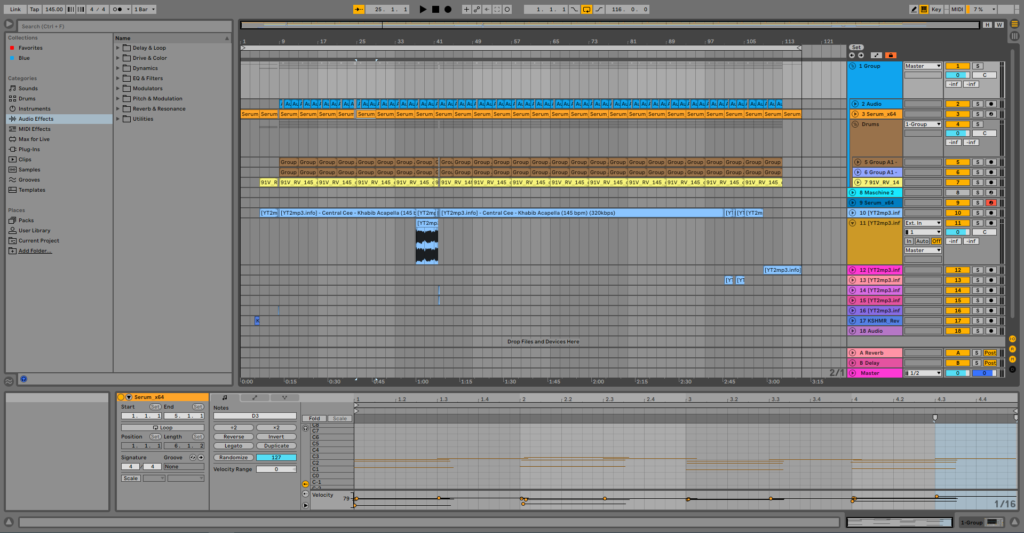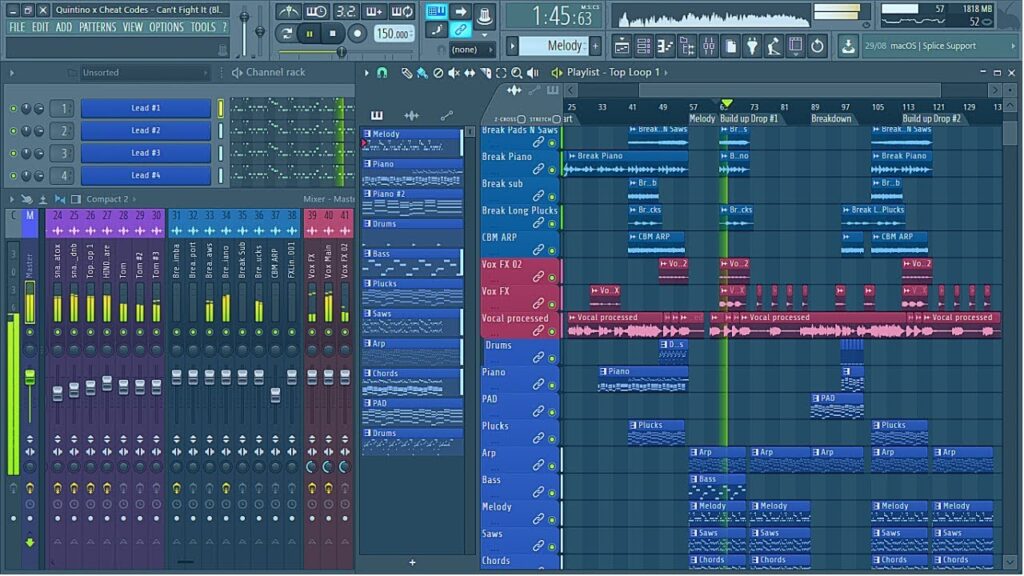If you’re new to music production, Ableton and FL Studio have long been two of the most popular digital audio workstations for producers, sound designers and musicians, and the debate to decide which one is better is as old as the software itself.
In this article, we’ll break down the key differences between the two and compare their features, workflow, compatibility with hardware, software, and price.
Remember that no DAW is perfect and built for every target audience, so deciding which one to use should be entirely based on what you feel is right for you.
Table of Contents
Ableton vs FL Studio: Features
Arguably the most important part of any DAW system is its features, as it can be a deciding factor between a creator using one system over another.
A great feature is what makes the process of creating electronic music more enjoyable for the user, and both Ableton and FL Studio have fast features that make them both standout options.
Choosing between the two can depend on your intended use of the DAW, as one can lean into being more beneficial than the other providing on your situation.
For instance, Ableton has two “views” both designed for specific purposes, session view is specifically intended for Live Performance for DJ Sets, but its arrangement view provides a similar workflow to other DAWs such as Studio One, Pro Tools or Logic Pro, but still sets itself apart vastly from its competitors, and features rich functionality for purposes other than beat making and music production such as audio editing, audio recording and multitrack recording.
While on the other hand FL Studio, does offer similar capabilities it is more geared toward beat-making and providing an efficient workflow to make music production as easy as possible, while you can record audio in FL, this feature isn’t as widely used as it is in other DAWs.
Both DAWs offer a wide range of versions which vary in features, let’s take a look at each:
FL Studio Editions Compared:
| Overview | Fruity Edition | Producer Edition | Signature Edition | All Plugins Edition |
|---|---|---|---|---|
| Audio Editors | 0 | 2 | 3 | 3 |
| Instruments & Effects | 84 | 91 | 99 | 111 |
| Audio recording | Not Included | Included | Included | Included |
| Audio clips | Not Included | Included | Included | Included |
| Playlist features | Partially Included | Included | Included | Included |
| Effects | Partially Included | Partially Included | Partially Included | Included |
| MIDI Support & Scripting | Included | Included | Included | Included |
| Included Content (Sample, Loops, Presets) | Included | Included | Included | Included |
| Lifetime Free Updates | Included | Included | Included | Included |
As you can see all editions of Fl Studio are packed with many features that are very enticing for producers, for instance, FL’s Fruity Edition is packed with 84 Instruments and effects, but it does lack the ability to record audio, which to me is an important feature for both beginners and advanced producers, however, this is included in all of the other editions.
Ableton Live Suites Compared:
| Overview | Intro Suite | Standard | Suite |
|---|---|---|---|
| Key Features | Limited | Full | Full |
| Software Instruments | 4 | 6 | 17 |
| Sounds | 1500+ | 1800+ | 5000+ |
| Library Size | 5+ GB | 10+ GB | 70+ GB |
| Audio Effects | 21 | 37 | 60 |
| MIDI Effects | 8 | 14 | 16 |
Every Ableton Live Suite come with the ability to record audio and plenty of software instruments, looking strictly at the topline features of both programmes, FL Studio may take the win over Ableton, due to the sheer quantity of what is offered. Ableton may offer a plethora of sounds in all editions, but arguably having more instruments and effects will be more important to most producers.
The tables above are how both Imagine Line and Ableton lay out their basic features and offerings on their sales pages, so to clear up a few things that you may be thinking about.
Ableton does offer free updates!
When you purchase a license for Ableton you purchase a license for that version, if Ableton releases an update, for version 11.0.01 or version 11.0.02, you will get those updates for free, however, if Ableton releases a new core version going from version 11 to 12, this update is not free.
Quantity vs Quality
Both Ableton and FL Studio offer great instruments and plugins, such as Gross Beat and Harmor which is a powerful additive synthesizer in FL, and Operator in Ableton which is also a powerful synthesizer that combines FM synthesis, with subtractive and additive synthesis, and FL takes the quantity win, however having tonnes to play with, doesn’t mean that it’s the best digital audio workstation around.
Ableton doesn’t focus on trying to be the prettiest system around, and there aren’t 101 ways to perform the same function, which in essence makes it a bit more streamlined and easier to get the hang of than most systems, Ableton simply focuses on being a system that works and is reliable, which provides easy to use functionality without having to make you flick through various screens to do what you want to.
Ease of use (Navigation)
On the left on the arrangement view, you’ll find the main browser where you can find every instrument and effect you’ll need neatly categorised and easy to find.
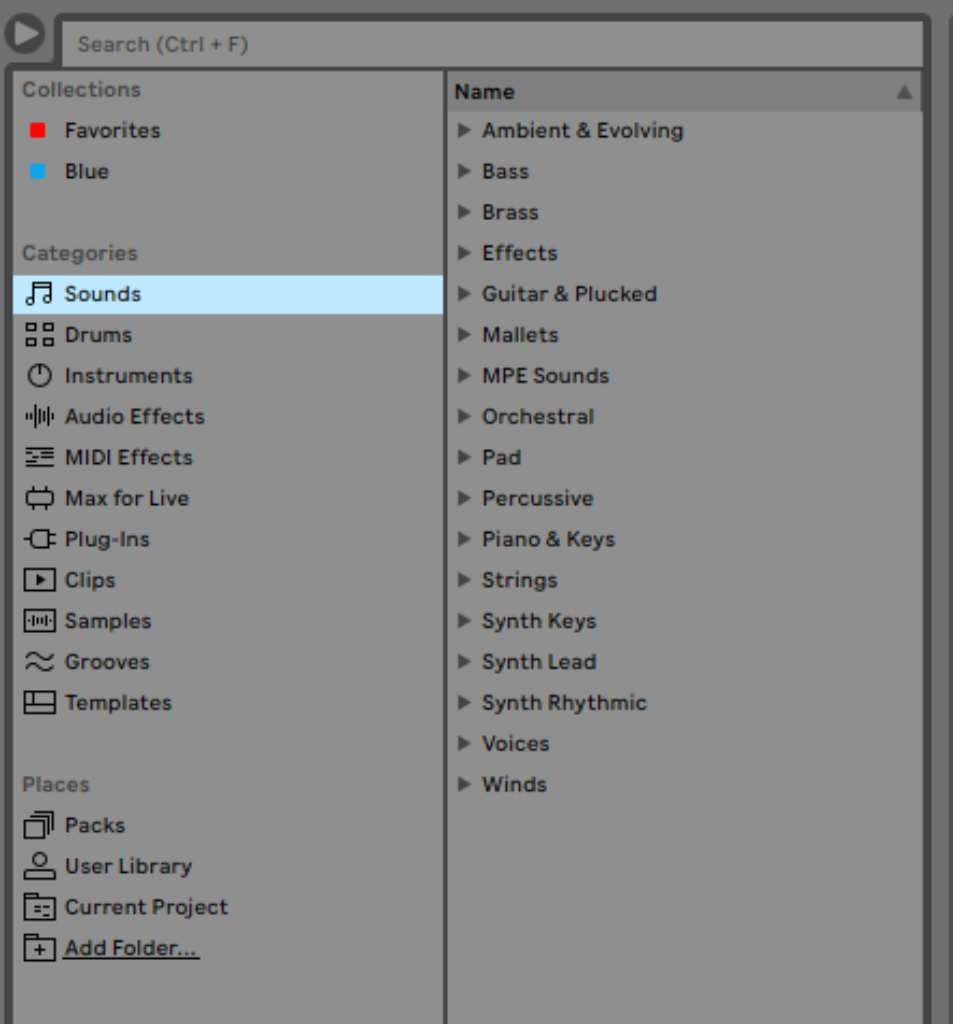
Under categories you’ll find:
- Sounds (This is where Ableton stores its library of stock sounds)
- Drums (Containing Ableton’s stock drum racks)
- Instruments (containing Ableton’s native instrument plugins such as Operator, Simpler, Sampler and more)
- Audio Effects (containing Ableton’s stock audio effects and native plugins)
- MIDI Effects (containing Ableton’s stock MIDI effects)
- Max for Live (containing any Max for Live Instruments that you have downloaded)
- Plugins (this is where all of your 3rd party plugins and any virtual instrument you need are accessed)
- Clips (this is where Ableton stores more of its stock sounds)
- Samples (this is where your recently imported 3rd samples are stored)
- Grooves (this is where groove examples such as 16th notes are stored)
- Templates (this is where Ableton Session templates are stored)
- Places (this is where you can setup your own custom file structure)
FL Studio has a similar navigational structure to the left of the interface but arguably it’s not as well organised, for ease of use I would give the win to Ableton for simply keeping things neat.
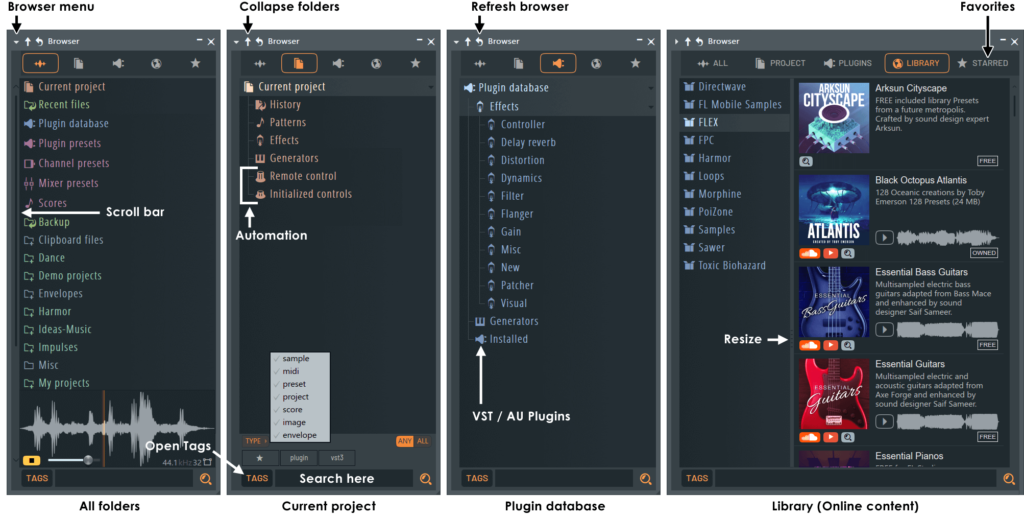
All stock plugins in Ableton share a nearly identical GUI which makes each instrument very easy to learn from scratch as most things look similar from plugin to plugin. In contrast, each plugin in FL bares a different design and flow, making it seem as if you’re learning an entirely new instrument, whereas most all share similar concepts and can be simplified.
Some of the standout plugins in Ableton include Echo, Glue Compressor, Amp, Simpler, Sampler and many more.
Which DAW Wins features?
In my opinion as someone that has used both FL and Ableton, Ableton takes the win on features, as I stated before, having tonnes of plugins and effects, is great but for most of them you’ll forget you have access to them, and as you develop your workflow, you’ll end up using the ones you’re most comfortable with.
For example, for more than 5 years, I have flitted between no more than 5 compressors, 2 EQs and no less than 10 virtual instruments, however, if having tonnes of instruments is something that sounds good to you, you may disagree with my assessment.
Ableton vs FL Studio: Workflow
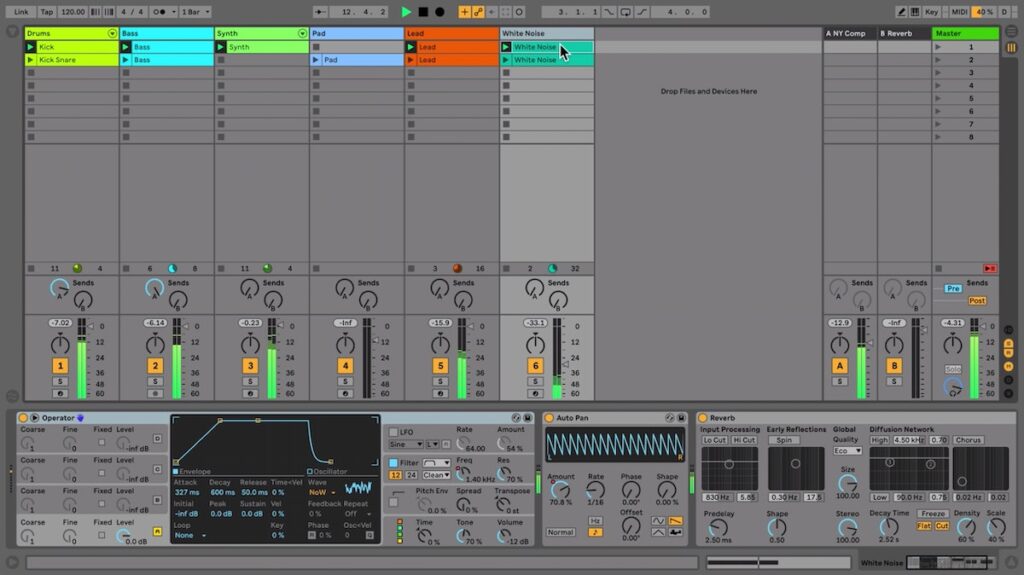
Both DAWs have desirable workflows, that would make them great options for any music producer, but deciding which has the best workflow when stacked up against each other comes down to one thing, which overall is the easiest to use?
As stated above, FL Studio workflow has a problem, but it can also be an advantage.
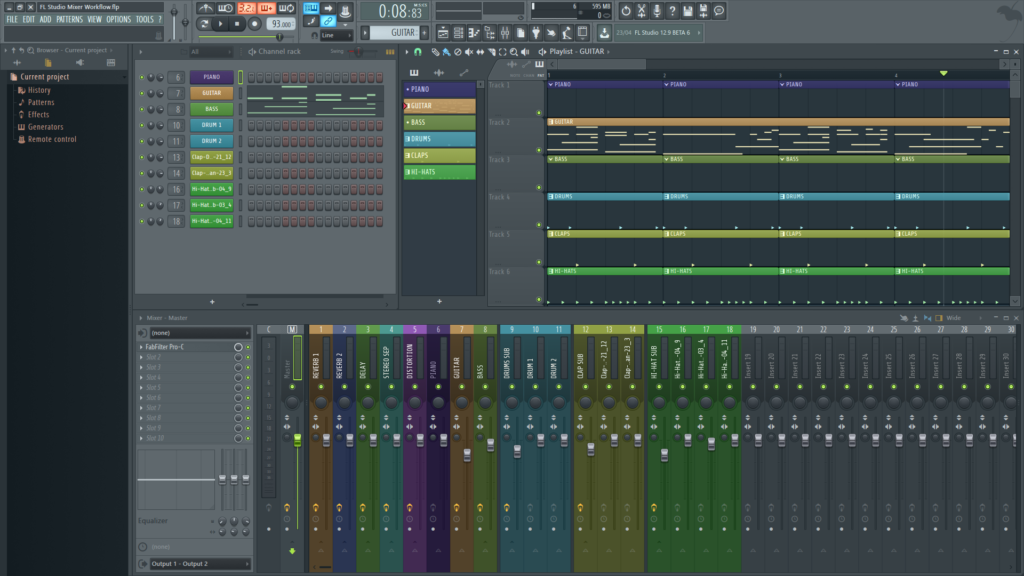
FL Studio has multiple ways to do very simple tasks, and while this is good for some people, for most it can lead to having an unclear workflow, and lead to more tinkering around than making music for beginners.
While on the other hand, an alternative view to the argument is that FL provides more flexibility, and allowing you to do multiple things in various ways means that the DAW can adapt to how you want to work, however, more often than not this will lead to more clicking around your session than finishing a song.
But if flexibility is something that you desire, FL may be worth exploring.
Generally, FL requires a more significant time investment to master because of this, whereas Abelton has much less of a learning curve, with most functions being 1 click away or a simple shortcut.
Ableton is faster than FL Studio
A big part of having a great workflow is having a system that is fast and easy to navigate, without a doubt, Ableton’s streamlined approach makes it much faster and easier to use than FL.
There are several features in Ableton that only add to its incredibly easy workflow, such as the ability to easily bounce Midi into Audio without having to leave the DAW, similar to the bounce-in-place feature in Logic Pro, called resampling.
Here is a list of some more of those features:
- Visual FX Chains: Ableton Live’s FX Chains are visual and don’t require opening separate plugins, providing a streamlined and efficient workflow for applying effects to your tracks.
- Sample Collections: Ableton Live allows you to create collections of your favourite samples, racks, or any other audio content without the need for duplicating the original files. This feature ensures organization and easy access to your preferred resources.
- Intuitive Channel Racks: Ableton Live’s Channel Rack is a unique feature is highly intuitive and can be saved for convenience. It enables you to combine multiple devices and effects into a single unit, allowing for quick and efficient sound shaping and processing.
- Easy Duplicating: Duplicating elements in Ableton Live is straightforward and doesn’t require switching between different tools. This simplicity allows for rapid arrangement and composition without interruption.
- Audio Freezing and Flattening: Ableton Live simplifies the process of freezing and flattening audio tracks. Freezing allows you to temporarily render resource-intensive tracks, reducing CPU load, while flattening converts MIDI and effects into audio, providing more flexibility and optimization.
- Resampling: Ableton Live offers a convenient way to resample audio by setting the input to Resampling. This eliminates the need to export the entire track and allows for direct sampling within the software, saving time and effort.
An important part of any workflow in music production is how easy the piano roll is to use.
Let’s take a look at the weaknesses and strengths of both:
Ableton vs FL Studio: Piano Roll
Ableton may have many desirable tools and features, but its piano roll is notorious for being a challenge to master, and not as easy to use as FLs piano roll.

Like much of the interface in Ableton for some reason, it has always reminded me of “Microsoft Excel” which I believe is because of its clunky nature, Its perhaps more powerful than most DAWs but its MIDI editing tools take a few more clicks to navigate around than FL Studio
By default, Ableton’s piano roll fits into the clip editor at the bottom of the screen, which can be expanded but not as easy as it can be in FL.
Ave Mcree has an excellent video comparing the two piano rolls, which is 5 years old, but is still relevant today as both of the GUI’s haven’t changed much, give or take a few features.
For piano rolls, I would give FL Studio the win, just because it’s simply more than user-friendly.
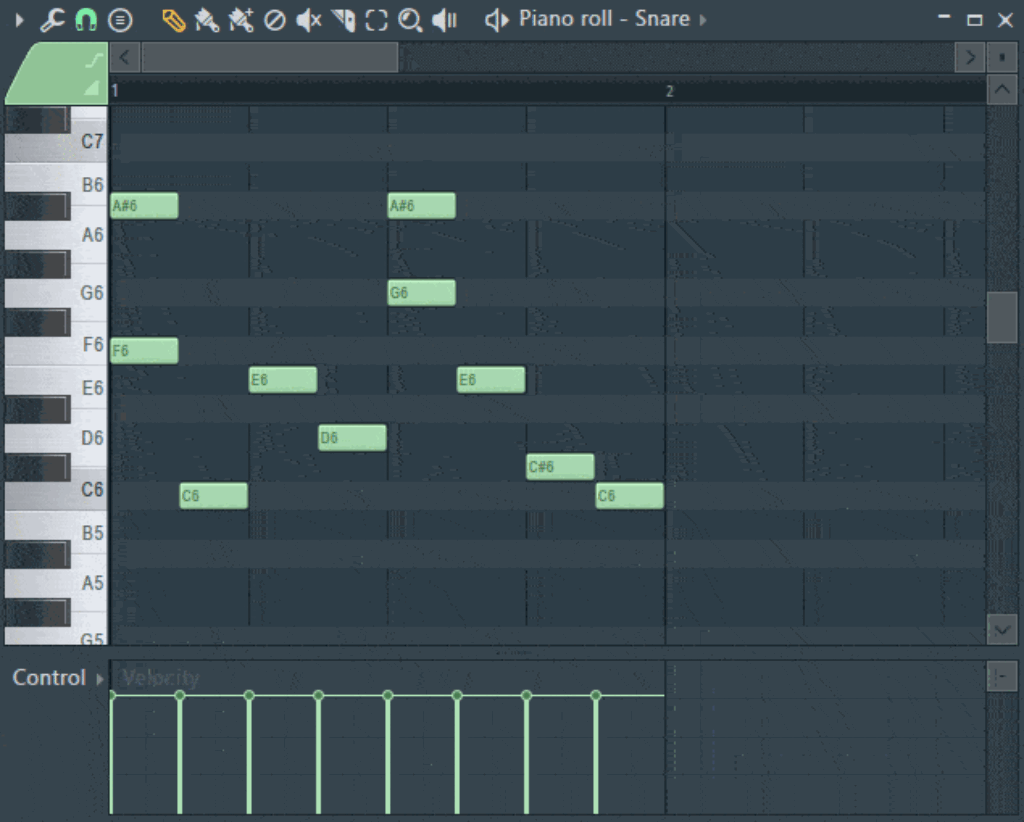
Sometimes Ableton’s Piano Roll can be unusable if you don’t have much experience you can get easily confused, with just a few mistaken zoom clicks and moving the edit window up and down, it can end up looking like this:

This is easy to fix, all you have to do is expand the edit window, but it can be annoying, for a full guide on how to use the Ableton Piano Roll, click here.
Overall for workflow, I’ll give the win to Ableton, while workflow is subjective, I’ve decided to give the win to Ableton because of most things being able to be accessed directly from the arrangement view.
You can certainly achieve the same results from the different DAWs but how you get there is incredibly important.
Ableton vs FL Studio: Compatibility
To have a system that works and is reliable, you need to make sure whatever program you choose is compatible with the system you’ll be running it on.
Here are Ableton Lives Minimum System Requirements for Windows:
| Overview | Details |
|---|---|
| OS Version | Windows 10 (Build 1909 and later), Windows 11 |
| CPU | Intel® Core™ i5 processor or an AMD multi-core processor |
| RAM | 8 GB RAM |
| Display Resolution | 1366×768 |
| Link Support | ASIO-compatible audio hardware for Link support (also recommended for optimal audio performance) |
| Recommended Storage | Approximately 3 GB disk space on the system drive for the basic installation (8 GB free disk space recommended) |
| Optional | Optionally up to 76 GB disk space for additionally available sound content |
And here are the Minimum System Requirements for macOS:
| Overview | Details |
|---|---|
| OS Version | macOS High Sierra 10.13 to Ventura 13 |
| CPU | Intel® Core™ i5 processor |
| RAM | 8 GB RAM |
| Display Resolution | 1280×800 |
| Recommended Storage | Approximately 3 GB disk space on the system drive for the basic installation (8 GB free disk space recommended) |
| Optional | Optionally up to 76 GB disk space for additionally available sound content |
| Recommendation | Core Audio compliant audio interface recommended |
As you can see Ableton is compatible with even some of the most basic setups, but one thing that causes concern is the RAM it requires, most basic laptops only come with 4 GB RAM pre-installed, so this may be something to pay attention to if your system has less than 8 GB.
Let’s also take a look at the same compatibility metrics for Fl Studio.
Here are FL Studio’s minimum system requirements for Windows:
| Overview | Details |
|---|---|
| OS Version | Windows 8.1, 10, 11 or later |
| CPU | The more powerful your CPU, the more instruments and effects you can run |
| RAM | 4GB of RAM |
| Recommended Storage | 4 GB of storage space |
| Note* | ARM not supported |
And here are the minimum system requirements for macOS:
| Overview | Details |
|---|---|
| OS Version | macOS: 10.13.6 (High Sierra) or later |
| CPU | The more powerful your CPU, the more instruments and effects you can run |
| RAM | 4GB of RAM |
| Recommended Storage | 4GB free disk space |
| Note* | Intel or Apple Silicon CPUs recommended |
Once upon a time, Image-Line were adamant that they would never develop a macOS version of FL, due to incompatibilities with coding languages, but after a few years wait, we now have one, which has gone through various stages of development and fixing various bugs and complaints from users along the way, the only weakness being that there is no 32bit version, but however if you’re using a newer mac this shouldn’t be a problem.
Ableton vs FL Studio: Hardware Compatibility
Ableton Live has no issues with hardware compatibility, having its own line of Hardware MIDI Controllers in Ableton Push, but it can also seamlessly integrate with various featured hardware from other manufacturers including Akai, Alesis, Native Instruments, Arturia, Korg, Novation and much more.
For a full list of compatible hardware, check out Ableton’s official page.
FL Studio doesn’t officially state what hardware such as MIDI controllers, they’re compatible with, but my assumption is that most basic USB-powered controllers are compatible as long as your audio interface can handle it.
Who wins compatibility?
It’s not very hard to determine a winner for compatibility, for Ableton you need at least 8 GB of RAM and an at least an Intel i5 CPU, which means Ableton won’t work on cheaper laptops and computers, but with FL Studio you have very little restrictions, it can run on lower grade computers, meaning that beginners can use it without the possibility of having to upgrade their current systems, which I would argue is more important than not having a 32bit version for macOS.
In this case, the winner is without a doubt FL Studio.
Ableton vs FL Studio: Pricing
One of the biggest determining factors behind any young producer choosing either FL or Ableton, is going to be price, so which one is cheaper?
But before we get into that, I want to make sure that I say, if you’re making a purchasing decision entirely because of money, you may regret your decision faster than when you made it.
I have tried out many DAWs in my time, including Reason, Pro Tools, Cubase, Ableton (for 2 Years), Logic Pro (for 5 years after that), FL Studio (for 1 year after that) and then finally I have been moved back to Ableton for the last two years.
So as you can imagine, I have some experience in weighing up DAWs, and ultimately what made me move back to Ableton, was just how streamlined it is.
But enough of my story, let’s take a look at the pricing of each next to the other:
Ableton Live 11 Pricing:
| Version | Price |
|---|---|
| Live 11 Intro | £69 |
| Live 11 Standard | £319 |
| Live 11 Suite | £539 |
FL Studio Pricing:
| Version | Producer |
|---|---|
| Fruity Edition | £85 |
| Producer Edition | £164 |
| Signature Edition | £255 |
| All Plugins Edition | £409 |
As you can see from the tables above, both DAW systems are more than affordable, with Ableton’s intro version, beating FL’s Fruity Edition by only £16, but FL’s top-tier edition “All Plugins” beats Ableton’s “Live 11 Suite” by £130.
With this taken into account, FL Studio wins the pricing battle.
So who wins the war?
As someone that has tried out almost every DAW system going, I have come to realise that each system is designed for a very specific type of person, FL is primarily for producers who like to customize their experience and have tonnes of options at their disposal, and Ableton is more geared toward not only producers and beatmakers but also sound designers and recording engineers offering a much more streamlined experience, which personally suits my working environment a lot.
I truly do think there’s a reason I came back to Ableton after using other DAWs for so many years, so in this case for me, Ableton wins the war, but FL Studio is one hell of a worthy adversary.

